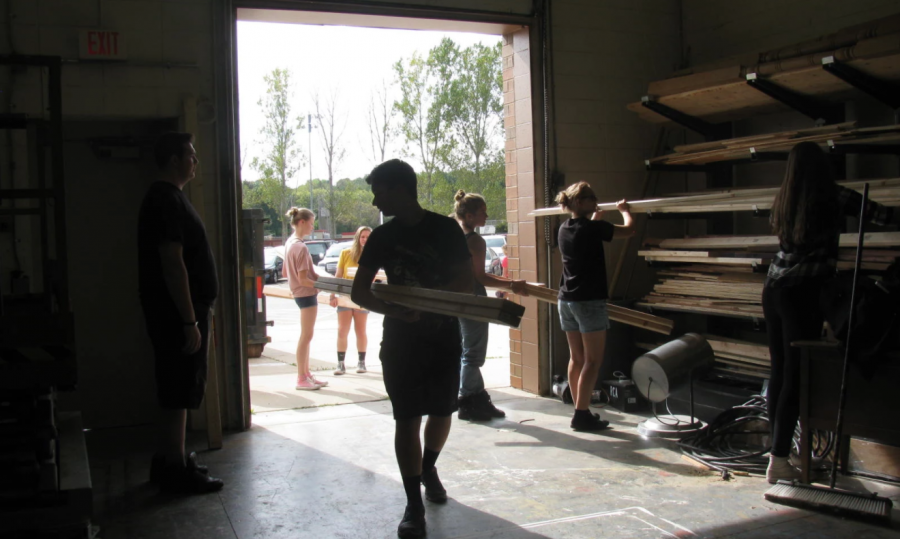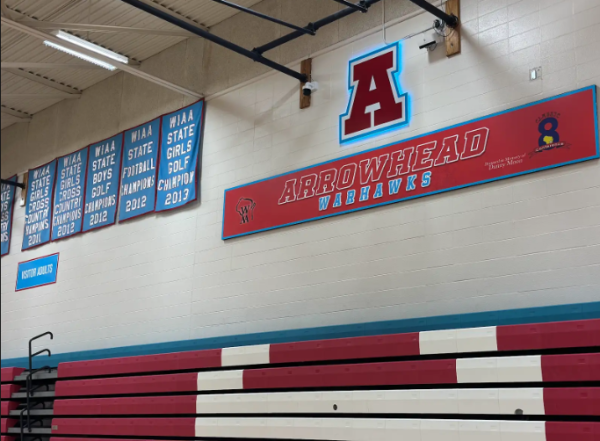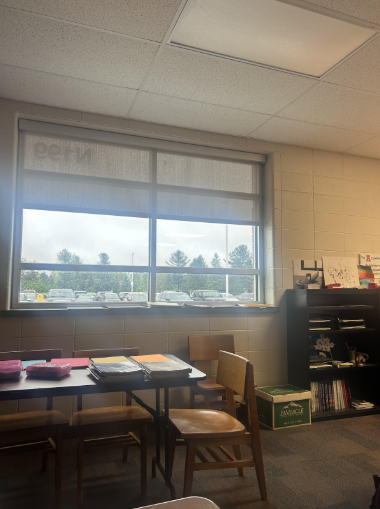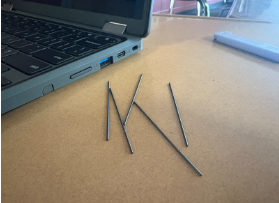Legally Blonde: Arrowhead’s Stage Crew Provides Support to Actors, Show
On October 19th, Arrowhead’s fall musical Legally Blonde had its opening night in the North Campus theater at 7:00 pm. Senior McKenna Plath starred as the main character, Elle Woods, alongside her co-stars from Broadway Company.
Behind the scenes, stage crew worked hard to make everything run smoothly.
Maralynn Markano, director of stage crew and Arrowhead English teacher, says there are many different roles in stage crew, whether it’s tech work or production work.
The tech crew builds, paints, and perfects the sets, and the production crew is involved in the live performance, working things like light and sound.
Junior Ben Niemczyk says they’ve been preparing for the musical since the second week of school.
“There hasn’t been an off day. We met on Tuesdays and Thursdays for a few weeks, and for the past few weeks we’ve been working every single day until about 9:00 [p.m.],” says Niemczyk.
Despite the long hours, Niemczyk says he loves being a part of stage crew.
“I love how people come together, and they build these amazing sets, and they become a second family for everybody,” says Niemczyk.
Markano says she has been in charge of stage crew for 17 years, and she loves how every show is unique and brings a new challenge.
“There was a year when we started getting new technology. Another year, we might have to make rows and rows and rows of cornstalks, and another year we had to tie a bunch of rope together to make a pirate’s rope that you could climb on. I’m always learning something new,” says Markano.
Markano says there is also much to be gained from being a part of stage crew, like real world skills such as building or painting, as well as technological skills.
“The bigger skills that they use every day are group dynamic and communication, because we are one big working machine with all kinds of moving parts, so if the communication isn’t there, it all kind of falls apart,” says Markano.
The kids in stage crew are also learning leadership skills and how to work well under someone else’s command.
“Different kids take on different roles within stage crew for different shows. You know you might be a spot-op in one show, where you’re learning how to obey commands from a stage manager, and then the next show you might be the stage manager giving those commands,” Markano says.
There are students who move on from stage crew to go to college for technical theater, says Markano. She says a handful of her students have chosen careers in technical theater, whether they choose lighting, design concepts, or something else.
“[Stage crew] helped me decide what I want to do for a career, which is technical theater,” says Niemczyk.
Markano and Niemczyk say that, while they love being involved in stage crew, there is a certain frustration that comes with it.
“There’s a joke about stage crew, where we do everything twice, and it’s not because we’re making mistakes, it’s because it’s a creative process. That can be frustrating,” says Markano.
Niemczyk says, “Everything you build, you essentially have to rebuild it as they want to change a part of a set, if it’s been done wrong. You build a set piece twice.”
Markano says she also views stage crew as a real learning experience with all the new people that come in every year.
“We teach someone how to put together a flat, which is a wall in theater, and they might not do it right the first time, and that’s okay, and they learn, and they’ll do it right the next time, and eventually they’ll be teaching somebody else. It’s frustrating but not in a negative way, it’s frustrating in a teaching-learning way, no different than making grammar mistakes on an essay,” says Markano.
The timeframe is also something that stage crew struggles with, says Markano. The fall show is always harder for them because they only have three or four weeks to get everything done, whereas they have two and a half months to prepare for the winter show.
With so much to do, stage crew can take up a lot of time, says Niemczyk—especially during the time crunch of the fall show.
“It’s a big commitment if you want it to be, but that’s more of the production side. It’s also flexible as well. During the Tuesday and Thursday meetings, if you can’t come you can’t come,” says Niemczyk.
Markano says new people are constantly joining stage crew throughout the school year, so it’s never too late to join.
“We take people all the time. And there’s different facets of stage crew. You can just come for our tech work sessions and just work on the building and the painting and setting up the lights, or you can be on production crew, which are the people who actually run the show. I get kids that join all year long,” says Markano.
If you are interested in joining stage crew, contact Mrs. Markano. You can e-mail her at [email protected].






